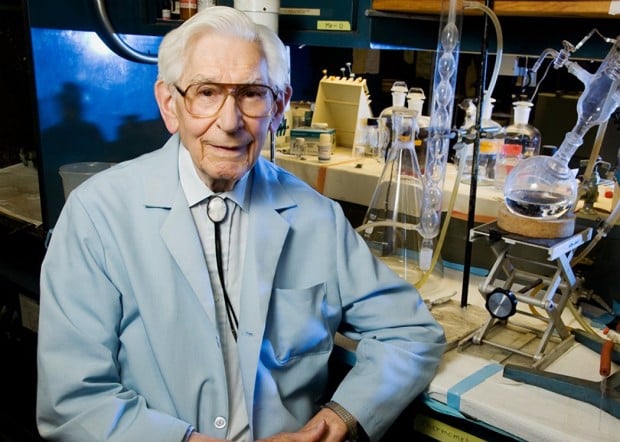The Elderly Iconoclast
"I've gotten the trans fat out of the diet -- has somebody else done that?"
"These oxidized fats [plaque blockages] get into the brain. And as I've been working for 60 years with fats and cholesterol, I thought I could make a contribution to Alzheimer's research."
"I've never relaxed in my life. I've always worked. When most people retire they may be good for a couple weeks or a couple months but eventually they don't use their brains enough and it's hard to get started on something."
"I want to do something that will contribute to the welfare of people."
Professor Fred Kummerow, biochemist, University of Illinois

Fred Kummerow, professor of veterinary biosciences, recently published his latest research on cholesterol and heart disease.
Professor Kummerow is technically retired. He, in fact, retired at age 71 as a teaching professor at University of Illinois, but it just isn't in him to retire from research into the subject he knows best and finds most interesting. All the more so since in his career as a scientist he has made a significant difference in most peoples' lives, although they wouldn't know it. But they are healthier [at least potentially] as a result of his findings and his lobbying of government health agencies.
Professor Kummerow focused on the deleterious effects of trans fats, commonly used by the food processing industry in food preparations, and in cooking products. Margarine contains trans fats, as do fried foods and crackers and snack cakes, among a panoply of pre-prepared food products and ingredients that most households use in food preparation. His interest in the effects of trans fats led to a greater understanding of all types of fats, most vastly preferential for optimum health outcomes, over trans fats.
Finally, after decades of writing about the link between heart disease and the intake of trans fats in most peoples' diets, the U.S. Food and Drug administration required food companies to phase out the use of trans fats in their products, from 2013 forward. In fact, Professor Kummerow had undertaken to sue the agency for failing to act on his indisputable findings of harm being produced from the wholesale use of trans fats.
The good professor is now focusing on other aspects of diet affecting human health and longevity. Diets poor in fresh fruits and vegetables are an especial interest of his. He had witnessed his sister-in-law's deterioration and eventual death from the effects of Alzheimer's disease. And he is convinced that poor diet plays a significant role in the onset of this brain-dementia disease that breaks down all the body's functions over time, leading to death.
Professor Kummerow investigated the meal menus used by the nursing home where his sister-in-law was domiciled while suffering from Alzheimer's disease, finding them to be loaded with carbohydrates at the expense of few offerings of eggs, vegetables and fruit. Which set him on a track to try to find reproducible proof of his theory that the consumption of a poor diet leads to a breakdown of normal brain function and ultimately all bodily functions.
He has applied to the National Institute on Aging for a $1.8-million, three-year grant for the purpose of studying the effects of diet on pigs' brains. Pigs are animals whose genetic construction is about as close to that of humans as any others in the animal kingdom that includes humans. Professor Kummerow has the practical support of two assistant professors at the College of Veterinary Medicine at the university.
Their plan is to feed diets to pigs that contain various amounts of fats. The animals' brains will be examined for the existence of plaques and blockages linked to Alzheimer's, and Dr. Kummerow is confident that a connection will be seen and isolated. The assistant professors are volunteers, giving half their university time to the project of working at Professor Kummerow's laboratory, funded by the professor himself along with donations from a few charitable foundations.
During his career, Dr. Kummerow has visited 32 countries, and produced a total of 460 scientific papers. In the 1970s he took a trip to the Soviet Union: "I wanted to know if they knew any more about heart disease than we did. And they didn't. Nobody knew more than we did", he stated with a good deal of personal satisfaction.
Personally, the professor avoids alcohol, and drinks whole milk. He eats baked chicken or fish, steamed vegetables and salad. Friends and family gathered recently to celebrate his 101st birthday when an angel food cake was served. Famously, this is a cake devoid of any fat content, but with plenty of eggs.
"He's somehow managed to avoid adopting the common wisdom about big medical issues, choosing instead to see for himself -- with fresh vision and original questions that nobody else has thought to ask", explained Diana Yates, health sciences writer at the university, for whom Professor Kummerow is an "iconoclast".
Labels: Diet, Health, Medicine, Science, Social Welfare

0 Comments:
Post a Comment
<< Home